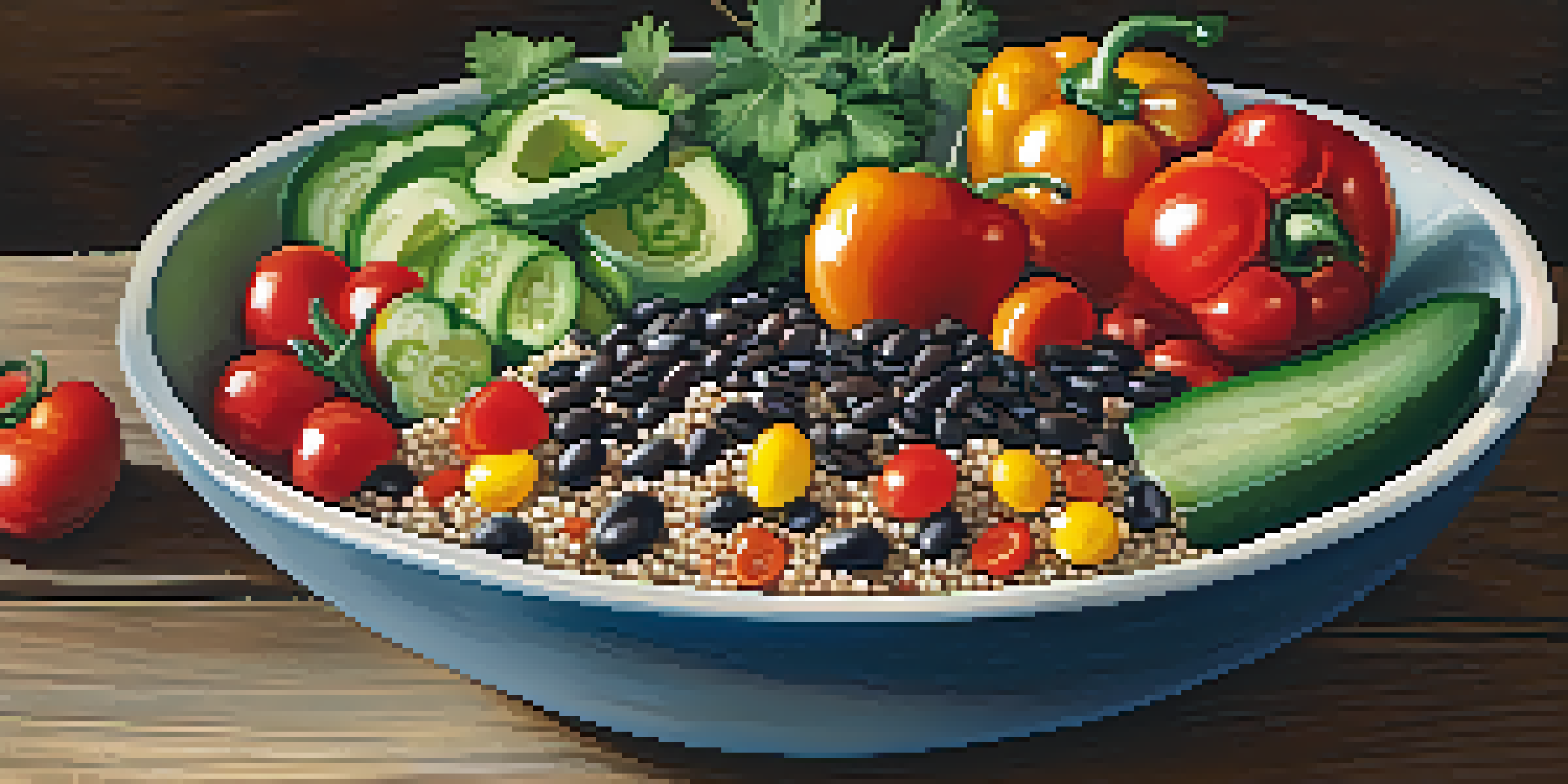How a Vegan Diet Supports Blood Sugar Control for Diabetics

Understanding Blood Sugar and Diabetes Basics
Blood sugar, or glucose, is a vital source of energy for our bodies. However, for those with diabetes, maintaining stable blood sugar levels is crucial to avoid complications. When blood sugar levels spike or drop too dramatically, it can lead to serious health issues, which is why understanding the basics is essential for effective management.
Let food be thy medicine and medicine be thy food.
Diabetes primarily comes in two forms: Type 1, where the body doesn’t produce insulin, and Type 2, which is often linked to lifestyle factors. In Type 2 diabetes, the body's cells become resistant to insulin, making it harder to regulate blood sugar. This is where dietary choices can make a significant impact, and a vegan diet can play a pivotal role.
By focusing on whole plant foods, individuals can improve their blood sugar control. Vegan diets emphasize fruits, vegetables, whole grains, legumes, nuts, and seeds, all of which have a low glycemic index. This means they have a slower, steadier impact on blood sugar levels, which is beneficial for managing diabetes.
The Role of Fiber in a Vegan Diet
One of the standout features of a vegan diet is its high fiber content. Fiber, found abundantly in fruits, vegetables, and whole grains, aids in digestion and helps regulate blood sugar levels. It does this by slowing the absorption of sugar into the bloodstream, which can prevent spikes after meals.

Including fiber-rich foods, such as beans and lentils, can significantly improve glycemic control. For example, a meal featuring black beans, quinoa, and a colorful array of vegetables not only nourishes your body but also maintains steady blood sugar levels. This is particularly important for diabetics who need to monitor their intake carefully.
Vegan Diets Support Blood Sugar
A well-planned vegan diet rich in whole plant foods can improve blood sugar control for diabetics.
Moreover, high-fiber foods tend to be more filling, which can help with weight management. Maintaining a healthy weight is crucial for those with Type 2 diabetes, as excess weight can worsen insulin resistance. Therefore, a fiber-rich vegan diet can support both blood sugar control and overall health.
Plant-Based Foods and Glycemic Index
The glycemic index (GI) measures how quickly a food raises blood sugar levels. Foods with a low GI are ideal for diabetics, as they lead to gradual increases in blood sugar, rather than sharp spikes. Many plant-based foods, such as sweet potatoes, most fruits, and whole grains, fall into this low-GI category.
The greatest wealth is health.
For instance, swapping out white rice for brown rice or quinoa can make a significant difference in glycemic response. Similarly, choosing whole fruits over fruit juices provides the benefits of fiber while keeping blood sugar levels stable. This simple change can be a game-changer in blood sugar management.
Incorporating a variety of low-GI foods into meals can create balanced dishes that not only taste great but also promote better blood sugar control. By planning meals with these foods in mind, diabetics can enjoy a diverse diet while still managing their condition effectively.
Healthy Fats in a Vegan Diet
While a vegan diet is often associated with low-fat eating, healthy fats are also essential for maintaining balanced blood sugar levels. Foods like avocados, nuts, and seeds provide unsaturated fats that can improve insulin sensitivity. This means your body becomes more efficient at using insulin, helping to stabilize blood sugar levels.
For example, adding a handful of walnuts to a salad or using avocado as a spread can enhance both the flavor and nutritional value of a meal. These healthy fats can also help keep you satiated, reducing the likelihood of unhealthy snacking. This is particularly important for those managing diabetes, as snacking can sometimes lead to unintentional blood sugar spikes.
Fiber Helps Regulate Glucose Levels
High-fiber foods slow sugar absorption, preventing spikes in blood sugar and aiding in diabetes management.
Incorporating these fats in moderation can support overall health, making them a valuable addition to a vegan diet. As with any dietary approach, balance is key. Emphasizing whole foods while including healthy fats can create delicious meals that are kind to your blood sugar.
Vitamins and Minerals Essential for Diabetics
A well-planned vegan diet can be rich in essential vitamins and minerals that support blood sugar control. Nutrients like magnesium, chromium, and vitamin D play a significant role in maintaining healthy blood sugar levels. For instance, magnesium helps regulate insulin action and glucose metabolism, making it crucial for diabetics.
Leafy greens, nuts, seeds, and legumes are excellent sources of magnesium, while fortified plant milks can provide vitamin D. Ensuring you get these nutrients can not only help with blood sugar management but also support overall health. Plus, a vibrant vegan diet often means you're getting a wide range of nutrients from various foods.
To maximize nutrient intake, it's vital to eat a colorful array of fruits and vegetables. This not only makes meals more enjoyable but also ensures that you're covering your nutritional bases. In the long run, this can lead to improved health outcomes for those with diabetes.
The Importance of Meal Timing for Diabetics
Meal timing can significantly affect blood sugar levels. For diabetics, eating regular meals and snacks can help maintain stable blood sugar throughout the day. A vegan diet can easily accommodate this approach by providing a variety of meal options that are both healthy and satisfying.
For example, starting the day with a hearty oatmeal topped with fruits and nuts can provide sustained energy and keep blood sugar levels stable until lunchtime. Similarly, incorporating small, balanced snacks, such as hummus with veggies or a piece of fruit with nut butter, can help prevent dips in blood sugar.
Consult Professionals for Guidance
Working with healthcare professionals ensures that a vegan diet is tailored to individual needs and health goals.
Planning meals and snacks ahead of time can help diabetics avoid the temptation of unhealthy choices when hunger strikes. By establishing a routine that incorporates balanced meals at regular intervals, individuals can take control of their blood sugar management more effectively.
Consulting Professionals for Personalized Guidance
While a vegan diet offers numerous benefits for blood sugar control, it’s essential to tailor it to individual needs. Consulting with a healthcare professional, such as a registered dietitian or a certified diabetes educator, can provide personalized guidance. They can help create a meal plan that meets your specific health goals and dietary preferences.
Professionals can also assist in monitoring blood sugar levels and adjusting dietary choices as needed. This collaborative approach ensures that you're not just following a one-size-fits-all diet but rather a plan that works best for you. It can make all the difference in managing diabetes effectively.

Additionally, staying informed about the latest research and recommendations can empower diabetics to make better food choices. With the right support and information, transitioning to a vegan diet can be a positive step toward better blood sugar management and overall health.